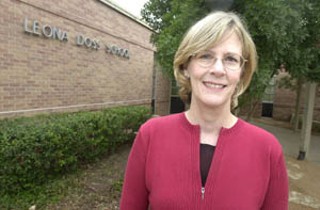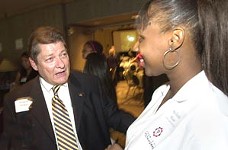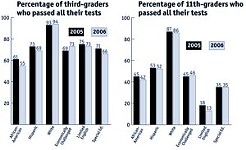Virtually Unkillable: TEA to Resurrect Online Charters
Supporters of 'virtual schools' never say die
By Rachel Proctor May, Fri., Jan. 16, 2004

Some folks just won't take no for an answer.
So it seems with the Texas proponents of "virtual charter" schools -- Web-based, generally home-schooled substitutes for classroom education. When the Texas Education Agency in December rejected the Eagle Academies' charter-school proposal to provide an all-online education to 3,000 students statewide, it was one more nay in a year of official nay-saying to virtual charters. Last spring, the Legislature gave thumbs-down to two virtual-charter bills, and in November, after a flurry of controversy, the University of North Texas dropped its virtual-charter proposal to the TEA. Despite the latest rejection, Eagle Academies' founder Forrest Watson says Eagle is undeterred. "We do plan to pursue every avenue toward realization of virtual schools," he said.
They may yet have their chance. By the end of the month, the TEA expects to release rules for a virtual-education pilot program for which Eagle, the largest charter-holder in the state, would be eligible to apply.
In other words, the virtual-charter battle is far from over.
Opponents of virtual charters are not technophobe dinosaurs opposed to the very idea of online education. They do oppose using tax dollars to fund full-time, unsupervised online education in students' homes. Carolyn Boyle of the Coalition for Public Schools says that when school funds are used to outfit students' homes with hardware, software, and an Internet connection, it's effectively taxpayer-funded home schooling -- leading critics to label virtual-charter proposals as "virtual vouchers." "When we can't even afford our brick-and-mortar schools, it's a poor time to fund home schooling," Boyle said.
TEA spokeswoman Suzanne Marchman says that because the state funds schools on a per-student basis -- currently about $5,000 a year -- and because that money would "follow" a child into a virtual charter, Boyle's charges are unfounded. "The funding stays exactly where it belongs, with a student's educational needs," Marchman said. But her answer presumes that every child is a discrete educational and financial unit -- and that upon his or her departure for a "virtual" school, her brick-and-mortar school magically "saves" $5,000 in fixed expenses.
The agency's official response also ignores the money that would land in the pockets of for-profit companies that sell software or subcontract for nonprofit charters. The officially nonprofit Eagle Academies, for example, is affiliated with Pathway Publishers, a for-profit company that provides the software students use for the all-online curriculum in Eagle's existing, physical charters. If Eagle gets to eliminate its brick-and-mortar costs -- not to mention standard public school services like nurses, buses, and a host of extracurricular programs -- the potential profit margin expands dramatically.
"People are drooling over the potential of getting [full per-pupil funding] when they have this low overhead," said Boyle.
Critics also worry about Eagle's track record. Twelve of Eagle's 14 charters are currently rated "low-performing" in state accountability ratings. Eagle argues that their schools have a harder task than most districts, since a high percentage of its students are nontraditional learners that standard public schools had failed. However, the TEA's Dec. 22 letter rejecting Eagle's proposal specifically cited as areas of concern Eagle's low performance, as well as its failure to address how its virtual charters would serve special education students. "If their scores are already low, when students have face-to-face interaction with teachers, what will happen when they have minimal or no interaction?" said Marchman.
Nevertheless, Eagle's persistence may pay off. Despite the many unresolved issues, the TEA's attitude on virtual charters still seems to be not so much a "no" as a "not yet." Watson points out that TEA's interim deputy commissioner, Robert Scott, encouraged the charter's original proposal. "Commissioner Scott didn't request us to submit [the proposal], but he did encourage us when we approached him about it, and mentioned he would be supportive," Watson said. Marchman confirmed that Scott met with Eagle representatives to help them fine-tune their proposal, but she added that charters frequently solicit feedback from agency staff on draft proposals.
Scott's rejection letter closed by reminding Eagle of the electronic course "pilot" for which districts and charters would be eligible to apply. However, state Rep. Scott Hochberg, D-Houston, who sponsored the 2001 bill authorizing the electronic pilot program, says a full-time, home-based program such as Eagle proposed is exactly what he did not want to come out of the pilot.
"The pilot is designed to study existing programs that were out there," he said. "It was not designed as mechanism to give charter schools an easy way to make money."
The idea, Hochberg said, was to find new ways to educate hard-to-reach students, such as teen parents or potential dropouts, or for online courses in subjects schools otherwise didn't offer. None of the 24 schools that participated in the first pilot offered full-time schooling.
Last spring, the Lege approved a continuation of the pilot, and Eagle wants in on the deal. Marchman says the pilot won't fund the kind of start-up expenses -- the hardware and software -- that a full-time, home-based program would require. So even with the support of TEA leadership like Scott -- and of Gov. Perry, who appointed him -- the pilot may not offer Eagle the chance it seeks to make the school's vision of a high tech correspondence course a reality. "We're not going to do it unless we can be funded for it," Watson said.
Judging from recent Capitol experience, if Watson's wish isn't immediately fulfilled, there will be plenty more virtual opportunities where this one came from.
Got something to say on the subject? Send a letter to the editor.









